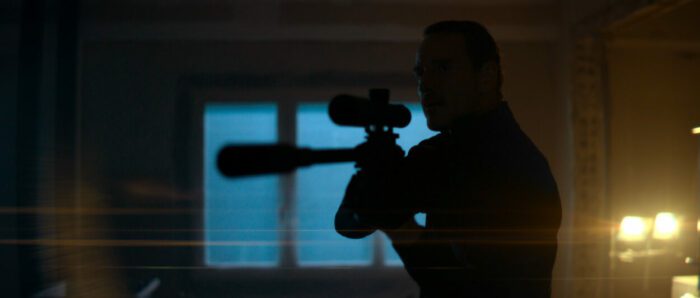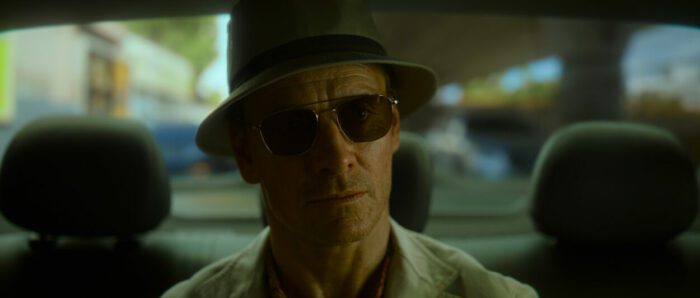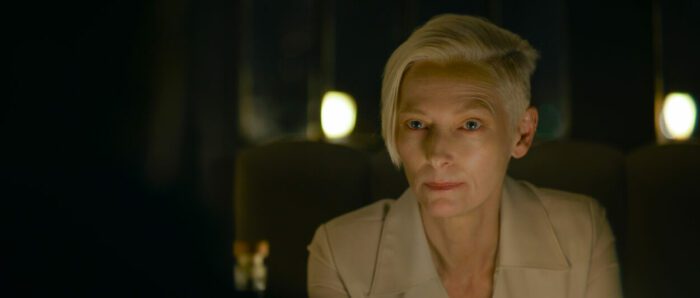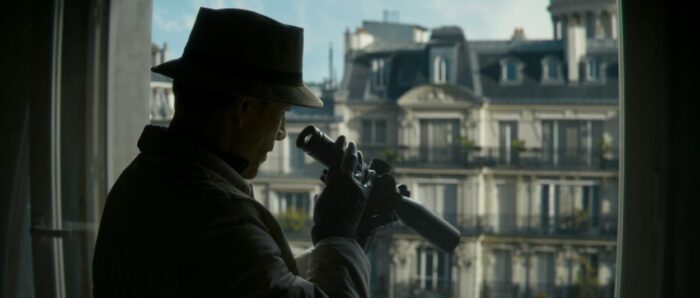To talk about The Killer is to talk about its director, David Fincher. I will say this immediately: David Fincher is my favorite director of all time. He has made some of my favorite movies, including the best film of the 2010s—The Social Network. Even when many people started jumping off the Fincher train with Mank (fools all of them, Mank is amazing), I could not have been more on it. Heck, I was probably driving the train.
The Killer—which, unsurprisingly, I loved and was practically levitating in my seat—is a special Fincher movie premiering in theaters before residing on Netflix through the awards season. Many directors like to insert themselves into their films through their characters and you can see elements of Fincher’s (in)famous personality in various parts. This is, however, the first time Fincher has gone full meta-textual and made a movie about the idea of himself. What it means to be David Fincher? What it takes to be David Fincher? What is the burden of being David Fincher? All of this is explored under the guise of a taut, exhilarating, and entertaining thriller that I could not get enough of.

What do we know about David Fincher? Well, the first word that comes to mind is perfectionist. It has been well-documented that Fincher is detail oriented, meticulous, and won’t settle for anything less than the golden standard. He’s notorious for doing hundreds of takes for one scene and has literally driven actors to the wall with his process. But, even with his methods, there is an aura of cynicism around him. Fincher clearly has love for cinema and, yet, approaches every movie with the mentality of a hitman.
So, when The Killer begins—a staggering cold open about Michael Fassbender’s character’s (only known as The Killer) fastidious routine exclusively told through narration—it isn’t hard to connect the dots. The Killer’s process in setting up a hit is akin to Fincher directing a movie. Every single detail matters and, at the same time, none of this matters. And, when the audience makes this connection, you finally find out that this isn’t just a neo-noir thriller—this is a full blown comedy.

The Killer is essentially Fincher re-examining his career and all the choices he’s made thus far. Both he and The Killer calculate every move with precision and pride themselves on never missing a target. Part of that has to do with having a lack of empathy. But, sometimes, fate has other plans. Sometimes, you mess up. Sometimes, your process and elaborate methods find a way to fail you.
On what should be a routine job, The Killer has a fateful near-miss causing his whole life to spiral and sending him on a manhunt. Now, there are so many ways to read this in the context of David Fincher. He one of the best filmographies of all time (in my obviously biased opinion) but some of his movies have sparked many a conversation. The aforementioned Mank prompted many to ask if Fincher had lost his fastball. Fight Club is such a fascinating text but has been interpreted in the wrong way by some harmful groups, causing a toxic effect on society.

Is Fincher reckoning with the fact that Mank was one of the few times he let his feelings and passion into his stone-cold process? Is he embarrassed about the fact that Fight Club has gone from beloved cult classic to the manifesto for some right-wing groups? There is so much that’s literal and so much underneath the text of The Killer that it’s hard to say one way or another. Perhaps the funniest part of the whole thing is that The Killer messes up his literal execution, similar to how a director’s execution can derail a whole movie.
Everything about The Killer is internal. Fassbender only has 10-13 spoken lines in the film and the rest is done through narration. Usually that would be a crutch to move along the narrative, but it is an integral part to the themes of the movie. It’s not about who can say the most, but who gets the job done. The internal dialogue of the movie allows us to see the moral conflicts the protagonist finds himself in. He’s loyal to his craft, but somewhere he has a heart that may be beating very faintly.

The most ironic part is that even amidst all the meta elements, the in-jokes, the direct allusions, The Killer is an outstanding Fincher movie with all the elements from a great Fincher movie present here. Not a single minute of screen-time is wasted and he successfully adapts Andrew Kevin Walker’s script (itself adapted from a French graphic novel series by writers Alexis “Matz” Nolent and artist Luc Jacamon) in stylish fashion by employing episodic structure with title cards as The Killer goes on his international revenge spree. Academy Award winner Erik Messerschmidt’s outstanding digital cinematography captures the dark shadows and gloomy world The Killer inhabits in a remarkable way.
Two of Fincher’s hallmarks are editing and background score and The Killer is no different. Frequent collaborators Trent Reznor and Atticus Ross’ stressful score adds another layer to the narrative and is out-of-this-world good. Perhaps the strongest technical element of the movie is Kirk Baxter’s editing. I was absolutely floored by the editing—it keeps the movie at a breakneck pace and each scene is cut with precision and thought. A special shout-out to the impeccable sound design, as well. From the sounds of The Killer’s many weapons to the way silence is used, it’s great how much it adds to the experience of an edge-of-your-seat thriller.

I’d love to know the whole process of casting The Killer since Fincher is essentially finding an actor to serve as his avatar. Fassbender—when given good material—is as good as any actor currently working in Hollywood. He had been on a cold streak until now and gives a wonderful stoic and weird performance in The Killer. Like I said, he’s given very few spoken lines and has to narrate a lot of his thoughts. His deadpan delivery absolutely captures the tone of the movie and he excels in delivering the many gallows humor lines during those internal thoughts. It’s a very physical performance where we see all the steps of The Killer’s routine: setting up snipers, doing yoga, riding a motorcycle, etc. Fassbender is very convincing in all these aspects, perhaps a little too convincing.
He isn’t asked to act as much as he is reacting. I take that back, he is almost asked to not react and retain his character’s stoic demeanor. He’s in almost every frame of the movie and great character actors—Charles Parnell, Arliss Howard, the amazing Tilda Swinton—come for a scene and two and essentially deliver monologues as The Killer takes it all in, not letting them see how it affects him. Some actor’s greatness lies in their eyes and face saying more than words. I’d argue Fassbender’s lack of emotion elicits the same reaction, proving to be nerve wracking and tense.

I have to highlight one scene in particular that I can’t wait to rewatch. One of the poor souls on The Killer’s revenge journey is a big, strong brute from Florida and the two get into a fight at a home. There have been elements of action in Fincher’s previous movies but this is the first time he’s directed a choreographed fight scene in the vein of the John Wick-style of action. It is a brutal fight that is filmed and edited extraordinarily. The two go from room to room, using various household items as weapons and you feel every single hit and punch they lay on each other. There’s also scarily good use of a ravenous pit bull that only adds to the excitement.
Some will and have already started to dub The Killer as “minor Fincher” or that this was all too easy for him. I can see where they’re coming from. David Fincher effectively created a seminal neo-noir thriller in Se7en and one could see The Killer as him returning back to those roots. What’s on the surface of this movie may not be as deep as his other works—The Social Network, The Girl With The Dragon Tattoo, Gone Girl—which had a lot to say without going very far into the subtext.

I respectfully and passionately disagree with all those claims. First of all, there is no such thing as a “minor Fincher” work. All his movies (even the ones I don’t resonate with as well) are endlessly rewatchable and are made with the highest level of craft. Those who can’t see that with The Killer aren’t getting the big picture idea. You can absolutely see this as a simple hitman thriller and have a fine old time and that’s perfectly fine. Yet, this is so much more rewarding when you embrace the meta-ness of it all. It makes for such an enjoyable experience where you’ll be tense and laughing throughout the movie watching this neurotic and OCD sociopath mercilessly kill while contemplating he has a soul or not. Now, do you get that aspect in any other movie? I don’t think so.
Most of David Fincher’s movies grow in appreciation as time goes along and The Killer will be no different. I am intrigued to see what he makes after this and if baring it all in this movie will have any affect. It will be fun to see how The Killer relates to his previous and future work since the idea of Fincher and his relationship to the world and directing is the central motif of the film. I’m sure there’s aspects of the all-time director that I missed and hopefully will catch on rewatches. Till then, I know that both he and The Killer are detail oriented guys who love to execute and listen to The Smiths.




